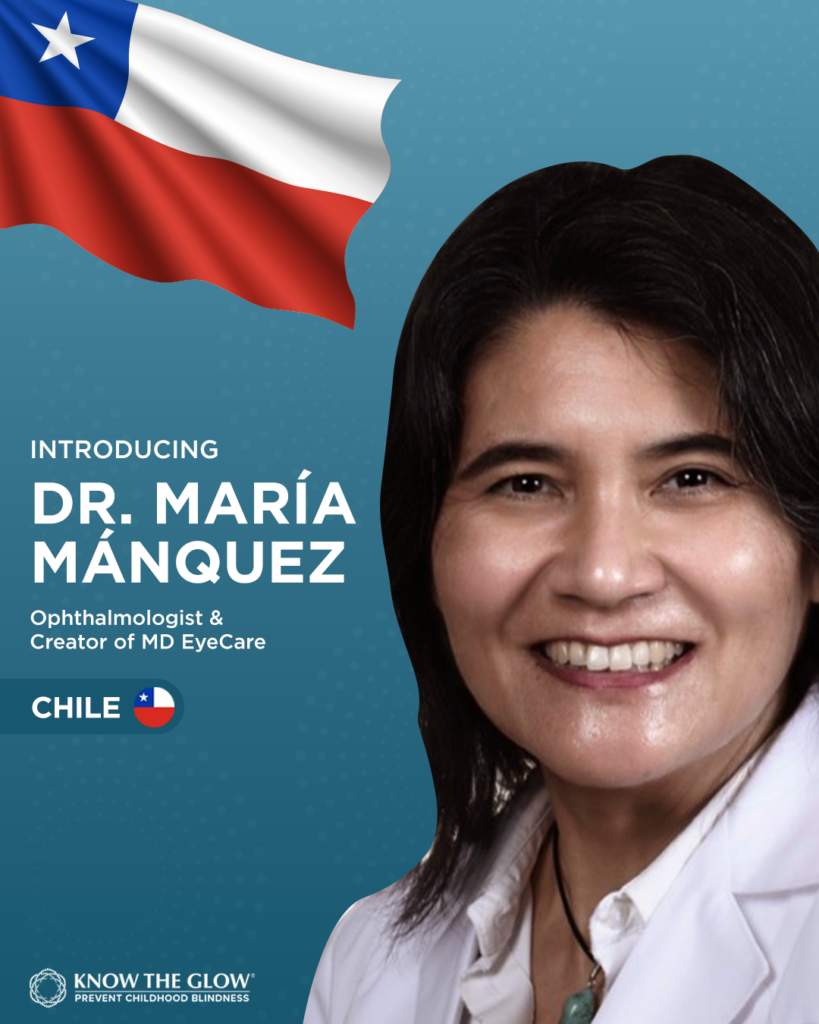KnowTheGlow (KTG) is always excited to share new technological tools with the potential to dramatically impact early diagnosis of eye disease. More than a year ago, Co-Founder Megan Webber reconnected with Dr. María Mánquez, an esteemed ophthalmologist from Chile and creator of MD EyeCare, a smartphone app designed to detect leukocoria. That first conversation took place soon after a meaningful encounter at the International Society of Ocular Oncology (ISOO) conference in Nairobi, Kenya, where both women presented on the importance of early detection of avoidable childhood blindness. KTG’s newly joined Chile Ambassador, Carla Soto Vargas, an adult survivor of retinoblastoma, and KTG’s Director of Global Outreach, Helene Dameris, also participated in the conversation. Carla emphasized the ongoing challenges faced by survivors in Chile, where despite a relatively small population of 18 million people, there are dozens of new cases of retinoblastoma each year, many of which are diagnosed late.
Dr. Mánquez trained as an ocular oncologist at the Wills Eye Institute in Philadelphia under the mentorship of Dr. Carol Shields, a member of KTG’s Medical Advisory Board. When she returned to Chile in 2006, she found herself confronting an alarming reality: far too many children continued to arrive with late-stage retinoblastoma. Her training had prepared her to treat complex cases, but she recognized that without earlier detection, her expertise could not be fully utilized. This realization inspired her to pursue new ways to intervene at the earliest possible stage.
The idea for MD EyeCare was born in 2013. It began as a simple app to capture leukocoria using the limited camera technology available at the time. With support from USAID between 2017 and 2019, her team laid the groundwork for an artificial intelligence network. Over time the app has evolved, and today it represents one of the most promising tools available for widespread screening of leukocoria.
In a recent Zoom meeting with KTG, Dr. Mánquez shared encouraging updates. After years of research and development, her team has now created a new multi-camera version of MD EyeCare. They have also developed an advanced AI engine capable of reading images and determining whether a red reflex is normal or abnormal. Crucially, this progress was achieved with the consent of parents, hospitals, and all stakeholders, thereby overcoming the ethical and regulatory barriers that had previously slowed earlier efforts. The results from recent R&D have been robust, confirming both feasibility and reliability.
Dr. Mánquez explained that traditional screening presents significant challenges. A 2021 meta-analysis revealed that the sensitivity of the direct ophthalmoscope, when used by non-ophthalmologists, is variable and may be low, depending on the level of expertise. Many abnormal reflexes simply go undetected. Compounding this problem is access: a survey of 120 ophthalmologists in Chile revealed that many did not even have a direct ophthalmoscope available, or felt uncomfortable using one. Similar findings were reported in New Zealand in 2015. In Chile, the shortage of pediatric ophthalmologists has led to lengthy waiting lists, with families often waiting months or years for specialist care.
MD EyeCare offers a simple alternative. Dr. Mánquez envisions the app being used in primary care facilities during well-child visits to screen children for abnormal red reflexes. Those flagged would then be referred to a hospital ophthalmologist for further evaluation. Her ultimate goal is for every child to be tested a minimum of three times annually, a significant increase in places where many children currently receive no screening at all before the age of four.
Support for MD EyeCare continues to grow. Dr. Carol Shields has provided a letter endorsing the app for clinical study, specifically as an alternative screening tool to the direct ophthalmoscope. Dr. Mánquez and her team were also recently selected as one of just 120 health innovation projects out of thousands to join MassChallenge, a prestigious accelerator program in Massachusetts. This opportunity has given her work visibility and credibility within global health and technology circles.
Dr. Mánquez remains deeply committed to advancing MD EyeCare and continues to build momentum around its potential. She has already received letters of encouragement from survivor-focused organizations such as We C Hope and values the role of patient families and advocacy groups in amplifying the importance of early detection. She believes that the voices of those directly impacted can often resonate just as strongly, if not more so, than those within the medical community.
Dr. Mánquez envisions MD EyeCare becoming available to pediatric healthcare personnel. The app is already compatible with iPhones and Android. Her team, which includes three engineers and an astronomer, continues to refine the product, and she has expressed her gratitude for the grants and mentorship that keep the project alive.
The current MD Eye Care version available in AppStore, is an old prototype. They have improved it with AI. The last version is not currently available in AppStore or GooglePlay now. It is in a pilot program.
For Dr. Mánquez, the mission is simple yet transformative: to ensure that children, no matter where they live, have access to early and accurate screening for leukocoria. The journey has not been easy, but her perseverance and vision have already brought her groundbreaking app to the threshold of clinical use. With continued support, MD EyeCare could redefine how the world approaches early detection of childhood eye disease.

